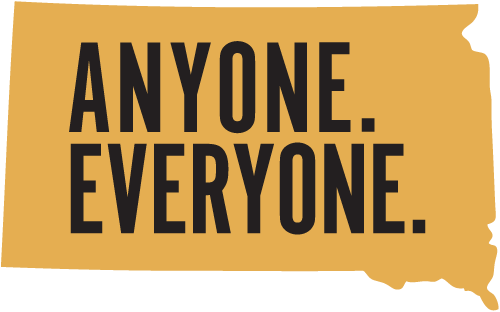I want to help get meth
out of South Dakota
You. Your neighbors. Your fellow South Dakotans are bound by the problem of meth. You’ve seen meth’s effects on the faces you know and even those you don’t. Now is not the time to discriminate, but to band together. Because meth affects everyone, and we need everyone to beat it.
Community of Advocacy
Whether you know someone personally affected by meth or not, assistance, prevention and safety are tenets to support your communities. Whether you want to volunteer, help someone in need or get more information, these resources can guide your advocacy.
Ways to get involved
In your community
Understand the warning signs of meth use
Signs of early meth use:
- Euphoric/”high” state (excessively happy)
- Decreased appetite
- Increased physical activity
- Anxiety, shaking hands, nervousness
- Incessant talking
- Rapid eye movement
- Increased body temperature (can rise as high as 108 degrees and cause death)
- Dilated pupils
- Sweating not related to physical activity
Long-term symptoms:
- Paranoia
- Sleeplessness, severe depression
- Nausea, vomiting, diarrhea
- Extreme irritability
- Seizures
- Teeth grinding, poor dental hygiene, body odor
- Skin ulceration and infections as a result of picking at the skin
- Auditory and visual hallucinations
- Violent, erratic behavior
- Nervousness
- Anhedonia (loss of pleasure)
- Dryness of mucous membranes
- Burnt or blistered lips and/or fingertips from holding hot smoking devices
Volunteer or support community organizations
- Form or join a local coalition to combat substance use and provide education in your community
- Start a fundraiser and donate proceeds to a treatment, recovery or support organization near you
- Volunteer with an organization that supports those impacted by meth, such as a homeless shelter or food bank (find a list of organizations here)
- Work with law enforcement to set up watch programs in your neighborhood
- Ask local law enforcement to speak at a neighborhood gathering
- Report suspected meth activity your local law enforcement or report anonymously to Project StandUp by calling 605-394-1884 or texting “DRUGS” to 82257
In your school
Provide education opportunities on substance abuse
- Organize a discussion or education session
- Start a peer leader organization to educate youth on substance use and provide support for those who may need help
Create a shared commitment to prevention
- Start a pledge for classmates to sign to show their commitment to not using substances
- Implement a school-based prevention program in your school
To learn more or to check-out a program, contact your regional Prevention Resource Center)
Provide alternative activities to keep youth engaged
- Extracurricular activities
- Community club sports
- School clubs
- Community-service clubs
- Mentorship programs
- Job training programs
In your home
Employ strategies to reduce your child’s risk for substance use
- Have ongoing conversations with your child about the dangers of substance use
- Role model healthy behaviors and attitudes
- Regularly discuss your child’s interests and take time to learn about them
- Get to know your child’s friends and their parents
- Spend time together, be fully engaged and responsible to your child
- Know where your child is and what they are doing
- Set clear rules and enforce them fairly
- Practice refusal skills with your children, such as direct refusal, exiting the situation or calling/texting you to get out of a pressure situation
- Provide alternative activities to keep them engaged in a drug-free life
Teach your children strategies coping to manage anger and stress
- Physical activity
- Listening to music
- Breathing exercises
- Meditation
- Journaling
Encourage opportunities for school and community engagement
- Extracurricular activities
- Community club sports
- School clubs
- Community-service clubs
- Mentorship programs
- Job training programs
Learn how to approach loved ones about meth use
Depending on your relationship with the individual and your comfort level, you may want to approach them about their substance use. If you choose to approach the individual, keep these steps in mind:
- Approach the individual when you are in a calm frame of mind, in a quiet, private environment
- Talk with the person openly and honestly, state objectively what you have observed
- Keep in mind the individual’s perceptions of their substance use and their readiness to talk and/or change
- Try to listen to the person without judgment and show you are concerned for their wellbeing
- Provide the individual with information on the types of help available
- Provide the individual with the Resource Hotline number, and offer to call with the individual. Call the Resource Hotline at 1-800-920-4343 or text “onmeth” to 898211, for help navigating the pathway to recovery
Toolkits
South Dakota Community Support Toolkit
The South Dakota Community Support Toolkit provides useful ways to:
- Understand meth’s presence in South Dakota
- Recognize symptoms of meth use
- Develop and enact prevention strategies
Prevention Groups
-
SD Department of Social Services Prevention Network [PDF]
Find substance use prevention coalitions and resource centers across South Dakota. Each coalition’s work is based on its community’s specific needs. Prevention resource centers provide additional training and educational support.
Prevention Resource Centers
To learn more about prevention, contact your regional Prevention Resource Center.
Tip Line
-
Project Stand Up Drug Tip Line
Tip line for citizens to call to report suspected illegal drug activity. Call or text “DRUGS” to 82257
